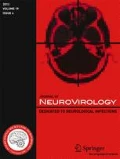Abstract
This study was conducted to evaluate longitudinal neuropsychological testing performance over a 12-month period among HIV + individuals, and to evaluate the impact of antiretroviral therapy (ART) initiation on neuropsychological test changes in Uganda. The study examined 77 HIV + individuals recruited from the Infectious Diseases Clinic at Makerere University, Uganda. They underwent detailed sociodemographic, medical history, immune status, functional, neurologic, and neuropsychological evaluations at baseline and 12 months later. Thirty-one individuals initiated ART (ART group) after their baseline visit, whereas 46 individuals were not placed on ART (no-ART group) during those 12 months. Paired samples t-tests were used to evaluate longitudinal changes in neuropsychological test performance for the entire sample, as well as for groups defined by ART initiation and baseline neurocognitive status. The study evaluated 77 HIV individuals (62 % women, mean age = 37 years, mean education = 8 years, mean CD4 count = 235 cells/μl). Both the ART and no-ART groups showed significant improvements in tests of verbal memory, executive functioning, motor, and psychomotor speed performance, as well as depression symptoms. The ART group had significant improvements in CD4 count over the 12-month period (p < 0.001), whereas the no-ART group had no CD4 count improvement. ART use is associated with improvements in cognitive functioning among HIV + individuals in Uganda. However, these improvements did not appear to be higher than those seen among HIV + individuals who did not initiate ART. Possible reasons for this include practice effects among the no-ART group as well as improvements in their mood and overall quality of life.
Similar content being viewed by others
References
Antinori A, Arendt G, Becker JT et al (2007) Updated research nosology for HIV-associated neurocognitive disorders (HAND). Neurology 69:1789–1799
Beck AT, Ward CH, Mendelson M, Mock J, Erbaugh J (1961) An inventory for measuring depression. Arch Gen Psychiatry 4:561–571
Birbeck GL, Kvalsund MP, Byers PA et al (2011) Neuropsychiatric and socioeconomic status impact antiretroviral adherence and mortality in rural Zambia. AmJTrop Med Hyg 85:782–789
Clifford D, Mitike M, Mekonnen Y et al (2007) Neurological evaluation of untreated human immunodeficiency virus infected adults in Ethiopia. J Neurovirol 13:67–72
Hestad KA, Menon JA, Silalukey-Ngoma M et al (2012) Sex differences in neuropsychological performance as an effect of human immunodeficiency virus infection: a pilot study in Zambia, Africa. J Nerv Ment Dis 200:336–342
Joska JA, Westgarth-Taylor J, Hoare J et al (2011) Validity of the International HIV Dementia Scale in South Africa. AIDS Patient Care STDS 25:95–101
Kanmogne GD, Kuate CT, Cysique LA et al (2010) HIV-associated neurocognitive disorders in sub-Saharan Africa: a pilot study in Cameroon. BMC Neurol 10:60
Karnofsky DA, Abelman WH, Craver LF, Burchenal J (1948) The use of nitrogen mustards in the palliative treatment of carcinoma. Cancer 1:634–656
Kwasa J, Cettomai D, Lwanya E et al (2012) Lessons learned developing a diagnostic tool for HIV-associated dementia feasible to implement in resource-limited settings: pilot testing in Kenya. PLoS One 7:e32898
Lawler K, Mosepele M, Ratcliffe S et al (2010) Neurocognitive impairment among HIV-positive individuals in Botswana: a pilot study. J Int AIDS Soc 13:15
Lawton MP, Brody EM (1969) Assessment of older people: self-maintaining and instrumental activities of daily living. Gerontologist 9:179–186
Maj M, Satz P, Janssen R et al (1994) WHO Neuropsychiatric AIDS Study, Cross-sectional Phase II. Neuropsychological and neurological findings. Arch Gen Psychiatry 51:51–61
Patel VN, Mungwira RG, Tarumbiswa TF, Heikinheimo T, van Oosterhout JJ (2010) High prevalence of suspected HIV-associated dementia in adult Malawian HIV patients. Int J STD AIDS 21:356–358
Robertson KR, Nakasujja N, Wong M et al (2007) Pattern of neuropsychological performance among HIV positive patients in Uganda. BMC Neurol 7:8
Robertson K, Jiang H, Kumwenda J et al (2012) Improved neuropsychological and neurological functioning across three antiretroviral regimens in diverse resource-limited settings: AIDS Clinical Trials Group Study A5199, the International Neurological Study. Clin Infect Dis 55:868–876
Sacktor NC, Wong M, Nakasujja N et al (2005) The International HIV Dementia Scale: a new rapid screening test for HIV dementia. AIDS 19:1367–1374
Sacktor N, Nakasujja N, Skolasky R et al (2009a) Benefits and risks of stavudine therapy for HIV-associated neurologic complications in Uganda. Neurology 72:165–170
Sacktor N, Nakasujja N, Skolasky RL et al (2009b) HIV subtype D is associated with dementia, compared with subtype A, in immunosuppressed individuals at risk of cognitive impairment in Kampala, Uganda. Clin Infect Dis 49:780–786
Salawu FK, Bwala SA, Wakil MA, Bani B, Bukbuk DN, Kida I (2008) Cognitive function in HIV-seropositive Nigerians without AIDS. J Neurol Sci 267:142–146
Smith A (1982) Symbol digit modalities test. Western Psychological Service
Wong M, Robertson R, Nakasujja N et al (2004) HIV-Associated neurological complications among HIV-seropositive individuals in Uganda. Neurology 62:A444
Wong M, Robertson K, Nakasujja N et al. (2007) Frequency of and risk factors for HIV dementia in an HIV clinic in sub-Saharan Africa. Neurology 350–355
Acknowledgments
The authors all received support from the NIH, and do not have a financial relationship with the research sponsor. The authors declare that they have no conflict of interest. The authors wish to thank Alice Namudde, Hope Mackline, and Charles Ssebunga for the data collection, and Marie Sonderman for editorial assistance. The authors also wish to thank the study participants for their willingness to participate in the study. This work was supported by grants MH083465 and MH075673.
Author information
Authors and Affiliations
Corresponding author
Rights and permissions
About this article
Cite this article
Sacktor, N., Nakasujja, N., Okonkwo, O. et al. Longitudinal neuropsychological test performance among HIV seropositive individuals in Uganda. J. Neurovirol. 19, 48–56 (2013). https://doi.org/10.1007/s13365-012-0139-5
Received:
Revised:
Accepted:
Published:
Issue Date:
DOI: https://doi.org/10.1007/s13365-012-0139-5



